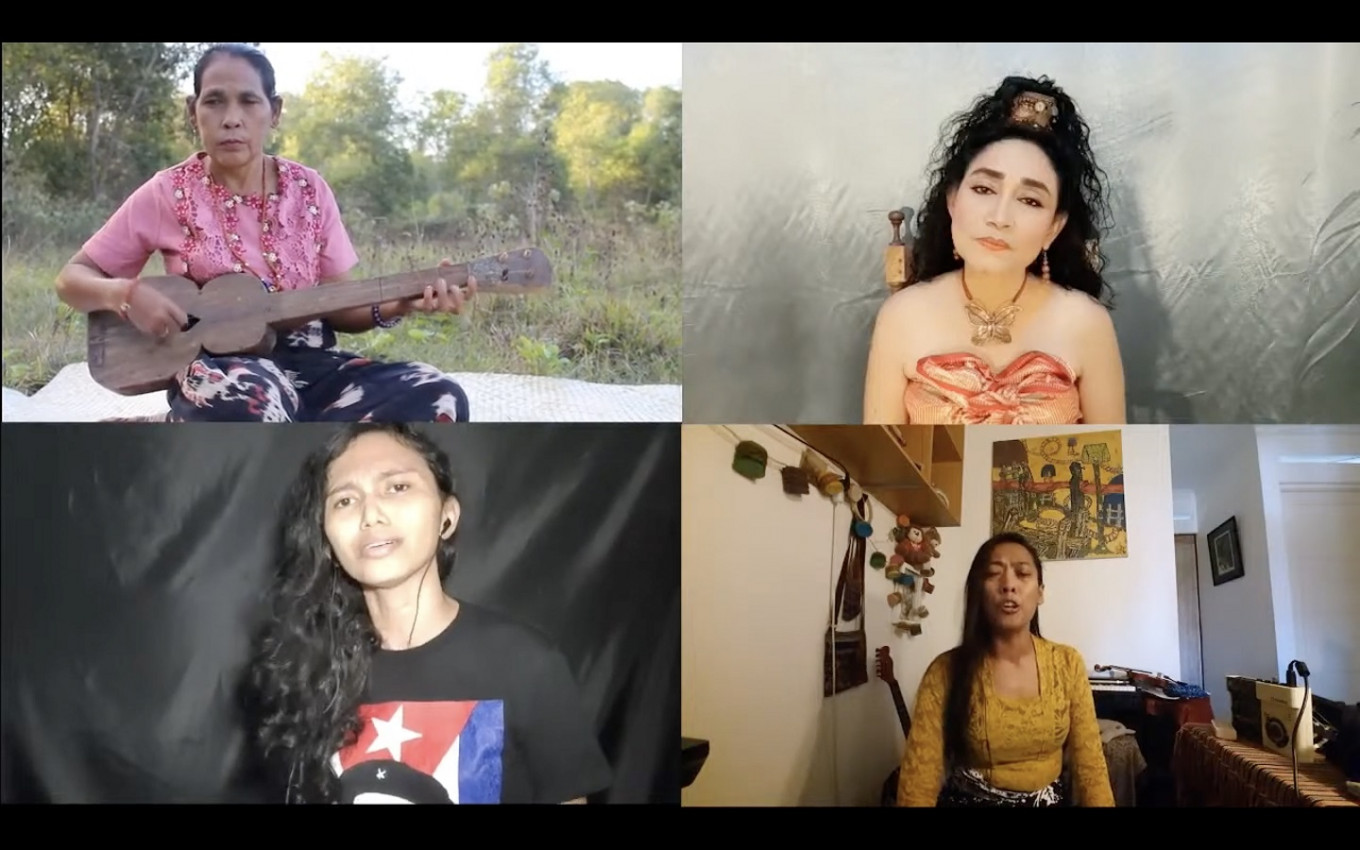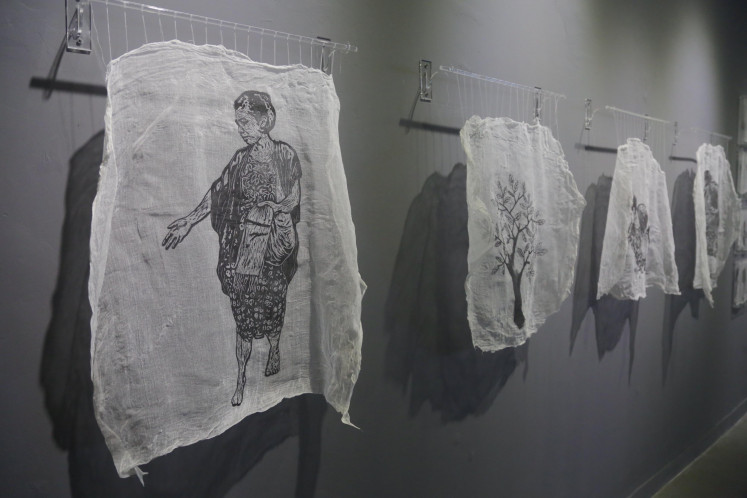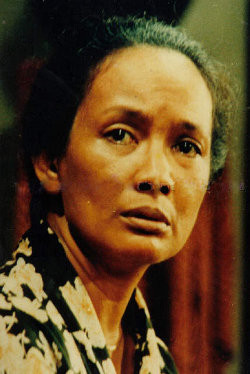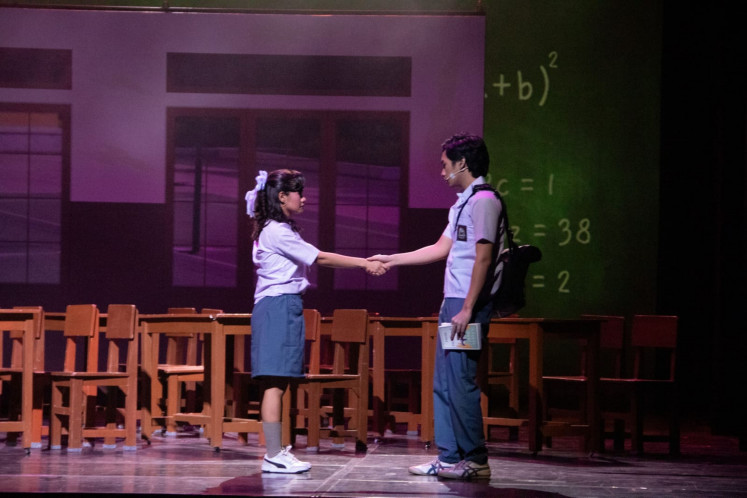Popular Reads
Top Results
Can't find what you're looking for?
View all search resultsPopular Reads
Top Results
Can't find what you're looking for?
View all search resultsIntersectional feminism, a window to women’s thoughts
Speakers talked about their experiences and hardships in pursuing careers in the male-dominated art industry.
Change text size
Gift Premium Articles
to Anyone
Though many women have taken center stage in the art scene, a patriarchal system continues to linger behind the scenes.
Scriptwriter Kadek Priscanti exposed the reality during her talk in the online feminist festival, Etalase Pemikiran Perempuan (A Window to Women’s Thoughts), organized under Cipta Media Ekspresi’s Sekolah Pemikiran Perempuan (Women’s School of Thought) program.
“Culture portrays women as all-patient, all-subdued, all-loving. So, it’s taboo when they’re outspoken, it’s taboo when they tell it like it is, when in reality, channeling these emotions is normal, as humans,” Kadek said.
“This is the reality that isn’t portrayed [in art]. The reality that these women are not comfortable, and censor themselves […] Theatre can play a role in bridging this”, she added.
Data from Purple Seven, an audience engagement specialist company for the arts and entertainment industry, shows that within their sample set of theatres from 2012 to 2014, a mere 39 percent of casts and 28 percent of playwrights were women, while 65 percent of the audiences were women. This gender disparity is consistent in Indonesia as well.
Kadek was one of the speakers in Perempuan Menawar Panggung (Women Bargain The Stage), one of the festival’s sessions, which also featured scriptwriter and traditional wayang puppeteer Sri Harti, writer and theatrical artist Naniek Indarti, as well as traditional sinden singer and researcher Agnes Serfozo.
A woman’s work: A piece titled "Menabur Benih" (Spreading the Seeds) by artist Theresia Agustina Sitompul during the Indonesian Woman Artist, Into The Future exhibition at the National Gallery on March 5, 2019. (JP/Wendra Ajistyatama)In addition to giving advice, Kadek and the other speakers talked about their own experiences and hardships in pursuing their careers in the male-dominated art industry.
The festival ran from July 24 to 26 and consisted of a series of talks and discussions.
Prominent initiators behind the festival include writer Intan Paramaditha, National Commission on Violence Against Women commissioner Andy Yentriyani, film programmer and archivist Lisabona Rahman, illustrator Cecil Mariani, playwright and director Naomi Srikandi and musician Nya Ina Raseuki.
There was also a two-part session, Riwayatmu, Puan (Your History, Women), in which panelists and participants took a look back at neglected woman figures within the Indonesian arts and culture scene. In an informative look into the lives of these people, their stories were made known and celebrated, as they were finally given the praise that they deserved.
Singer Bonita presented the life story of Utati, a woman wrongly jailed for 11 years, due to her association with the Pemuda Rakyat (People’s Youth), an organization affiliated with the now- defunct Indonesian Communist Party (PKI).
Following the foiled 1965 coup movement, allegedly masterminded by the PKI, Utati, like most communist-affiliated individuals at that time, were sent to jail and during her time in incarceration, she composed songs.
Following up Bonita, Jakarta-based author Ziggy Z told the story of writer Tan Lam Nio, an author of Chinese descent, whose works were guided by a strong feminist narrative in a time where works dominantly saw the placation of female characters.
Iconic actress: Actress Tuti Indra Malaon was one of the icons covered in the second part of the Riwayatmu, Puan session. (Wikipedia/-)Then there was also the life story of Balinese artist Mangku Muliati, chronicled by curator Alia Swastika. Muliati created traditional Kamasan art as a woman in a male-dominated profession, rejecting the conventions of the patriarchal scene.
The second part of Riwayatmu, Puan, featured the stories of writer Lasminingrat, who wrote several books regarding female emancipation during the 19th century, and helped found Sakola Istri, the first educational system for females in Indonesia, by educator Rena Amalika Asyari, a session on Hoeriah Adam, an iconic choreographer within the world of traditional Indonesian dance, by dance researcher Helly Minarti, and a discussion on actress and drama academic Tuti Indra Malaon, who influenced many through her strong public persona and time as a professor, by academic Melani Budianta.
Lisabona, who moderated both the Riwayatmu, Puan session, eloquently illustrated the importance of celebrating forgotten women figures in the arts scene.
“The celebration of women often rests on their beauty, judged by the dominant male gaze, over the brilliance of their thinking. Riwayatmu, Puan is a forum so that we may celebrate the achievements, recognize their thoughts, and refuse to forget the women that were removed or underestimated in history”, she said.
According to Asia Society’s Center For Global Education, the colonialism of the mid-20th century has given rise to the male argument for placing the notion of national independence before female concerns and equality. The resurgence of patriarchal religious tradition is also cited as another barrier to feminism in south east Asia, which limits the ability for women to attain more influential roles.













